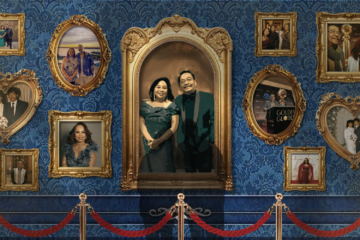
AS THE spotlight struck his face, Leland Lim stood frozen onstage for a moment.
A thick silence enveloped him, begging to be broken.
Bearing the hushed room and the glares of his audience, the lone stand-up comedian held the microphone — a tool not just for amusement but also for forging connections. Like any other night at the comedy club, it was a moment for new material that he hopes will draw laughter and maybe even a spilled drink or two.
Blessed with a natural wit, Lim instilled a deep appreciation for the power of ideas, even those that might raise eyebrows.
By day, Lim is an associate creative director, navigating the corporate world with practiced ease. But by night, he transforms into a comedic alchemist, turning daily experiences into laughter.
“I always go back to comedy for some validation and some sort of [way] to restart the day. It allowed me to find my voice as a person because you’re sharing something that’s deeply personal to strangers,” Lim told The Flame.
Comedic calling
Like many students, Lim was unsure which path to take after college in the UST Faculty of Arts and Letters (AB). While he was a capable student, his mind gravitated towards the creative side – quirky headlines, wordplays and advertising.
Known affectionately as “Chief” during his college days, Lim was a member of the Concilium Philosophiae’s creatives committee, the philosophy program’s student society. He also represented AB in the annual Thomasian Goodwill Games.
Studying philosophy was a suggestion from his father. He was even initially set to take up law, but Lim quickly discovered that these paths did not resonate with him.
“After graduation, I took LAE (Law Aptitude Exam) at UST and UP (University of the Philippines), but I didn’t even finish both exams because I couldn’t do that every day. I can’t imagine reading every day. It wasn’t for me,” Lim said.
Soon enough, Lim discovered his true passion for stand-up comedy.
He found inspiration in the works of acclaimed comedians like Louis C.K. and Chris Rock, drawn to their unique styles, sharp wit and ability to address complex and sometimes controversial topics with humor.
Louis C.K even became the subject of Lim’s final thesis during his undergraduate studies.
Taking the stage
It was 2018, and there was a small open mic night buzzing with hopeful comedians in a Metro Manila hub.
Dressed casually, Lim stepped into the stage and took a deep breath. He launched into his set and was given three minutes to crack jokes. Seconds later, the room erupted in laughter.
When asked if this was when he felt stand-up was his calling, he said: “I realized it pretty early because it was the first time I set foot on stage.”
Drawing parallels to the historical role of slapstick in late-night New York City theaters, Slate Magazine defined stand-up comedy as a modern evolution of comedic performance and an escapism from the hustle and bustle of city life.
Lim emphasized the artistry of stand-up comedy, comparing it to spoken word poetry. While both require talent and skill, stand-up demands an additional layer of “inventiveness” to ensure the perfect blend of humor and timing.
“[Stand-up comedians] should be [seen as] artists,” Lim added.
“They are artists.”
Lim’s humor draws inspiration from his advertising background. He admitted to often using familiar brands like Goldilocks and Puregold, twisting them as bizarre as possible until they turn into humorous narratives and unexpected punchlines.
“Audience always remembers my material,” he said.
“They say ‘Ah, si boy Puregold yan!,’ ‘Uy, si par!’ ‘Uy, si Goldilocks!’”
The threat of cancel culture
As the art of stand-up can be unhinged, Lim was like walking on eggshells, balancing the potential for laughter with the risk of unintended offense.
“Actually, of all the jokes I’ve told (in comedy clubs), I’ve been called out for the ones I just put online,” Lim said.
He recounted one incident involving “matronang hecklers” at an open mic who, unfamiliar with the sometimes irreverent nature of stand-up, took offense to his lines. Lim, ever the professional, handled the situation with skill and humor.
“It went on for 15 to 20 minutes. That’s how bad it was,” he said.
The rise of “cancel culture” has further intensified the pressure on comedians, creating constant online scrutiny of their humor. But while Lim has not received direct threats, he acknowledged the online call-outs to him as a form of “cancellation.”
Interestingly, he does not shy away from hecklers.
“Ah, that’s my favorite because it is an opportunity to (challenge) people who have this ego that radiates ‘I’m going to make this situation about me,’” he said.
“Well, I can make (the situation) about them by making fun of them… and the whole crowd will still be laughing with (me).”
As he masterfully transforms hecklers’ attempts to disrupt the show into unexpected comedic moments, this creates laughter and connection with his audience, as if he is making them part of his circle of friends.
A living philosopher
Lim’s background as a former student of wisdom has deeply influenced his approach to life and stand-up comedy.
He continues to embrace John Locke’s “tabula rasa” theory, viewing the mind as a blank slate shaped by individual experiences and choices.
“It’s up to you to design the interior of your mind,” he explained.
“I feed my brain with things that I want to manifest.”
For Lim, stand-up is not just a career, but an artistic expression that allows him to fool around professionally and explore and evolve continuously – without even a pinch of regret.
“It doesn’t matter if it’s a big or small venue, as long as the things you’re sharing with other people are the things that happened to your life,” he said. F




Very interesting!
Simply told but it unfolded the real meaning of career and fulfilment. Blending the arts of giving laughter and the risk of unintended offense is challenging .
Well, making connections with the audience is a stand-out performance.
Stand-up comedy is a combination of wizardry and artistry. It is an outstanding manifestation of cleverness, intelligence and communication skills in forging connection and humor with the audience using personal insights and experiences in everyday’s hustling and bustling city life.